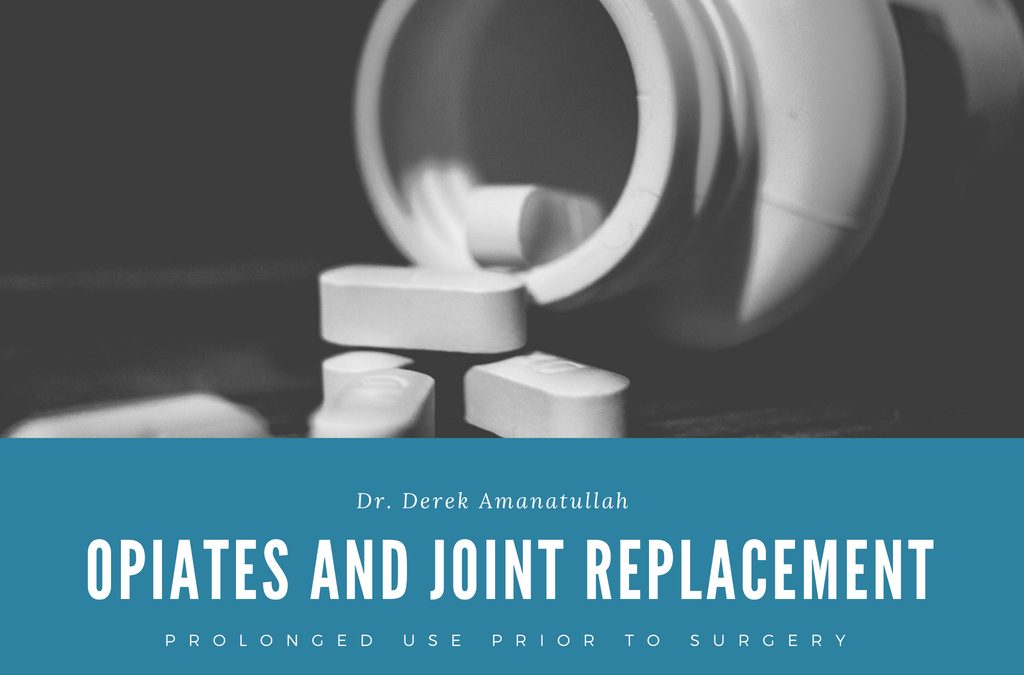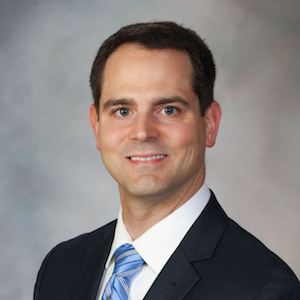Interviewer: Hi and welcome back Dr. Amanatullah. It’s great to hear from you again.
Dr. Amanatullah: Great, thanks for having me!
Interviewer: Oh anytime! Well, let’s get right into this month’s topic. There has been a lot of talk recently regarding the effects of certain medicines on joint replacements, and opioids, in particular, have dominated the news. Why don’t we start off with a bit of an explanation of the problems surgeons may be facing in relation to this painkiller.
Dr. Amanatullah: Absolutely. It is a very particular problem, especially in orthopedic surgery because we’re, ultimately we’re really dealing with pain and managing patients’ pain both preoperatively and postoperatively unfortunately sometimes is linked to narcotic medications or opioids. I think it’s important to break it down into two main phases. One is the before surgery and the other one after surgery. Both are important for different reasons. The first one, preoperatively, it’s important to understand the role of opioids because it affects my ability to control someone’s pain over the long-run and maybe after surgery. Additionally, after surgery, it’s important to understand the role of opioids because it can lead to long-term opioid utilization, and those are both important trends to understand kind of in the current climate that we’re in with the overutilization, overprescription of opioid medications.
Interviewer: Absolutely. And that’s very interesting that you differentiate between presurgery and postsurgery. Do the risks associated with prolonged use prior to surgery outweigh the benefits of pain management?
Dr. Amanatullah: Yeah so that’s exactly one of the more interesting questions and I would say, coming from the perspective of the surgeon, the answer to that is yes, that opioids are very good at short-term control of pain. But utilization in the long run, especially for a disease like arthritis that can be treated surgically, that after a patient fails nonsteroidal anti-inflammatory medications (NSAIDs) and has done a bunch of things to modify their life and maybe trialed an injection, with or without opioids it’s probably time to contemplate surgery. So for me, seeing a patient on opioids before surgery actually is a giant red flag. It means that they’ve been getting long-term management with an acute pain care drug, may have some already built-in…not addiction but sensitization issues meaning they may need a lot of narcotics in order to control their pain after surgery. And that remains a major issue for us if we’re gonna consider surgical intervention because, again, those patients are gonna need more of a dangerous medication both for addiction but also side effects. And those side effects are numerous. Constipation, confusion, urinary retention— all falls, all kinds of different things related, pretty much every bad medical side effect is related to opioid utilization, so really counseling them on weaning it off before surgery as best they can is a good thing. Sometimes patients can’t get all the way off or are taking narcotics for a different reason, meaning addiction or spinal pain or some other issue. But getting it down as low as possible or seeing it there not at all is clearly a preference and linked with lower amounts of side effects.
Interviewer: Sure. So, is there anything specifically that the surgeon can do to combat prolonged use or prescription prior to surgery, or is that in the hands of the prescribing physician?
Dr. Amanatullah: Yeah, I think it’s in the hands of the prescribing physician. Most of the time we see them it’s too late. We’re really not managing the acute phase of the disease. We kind of see them when people determine they need a joint replacement, but unfortunately, there’s no one really needs a joint replacement. They may think they need it but they want it, and we ultimately have to agree to do it. Some surgeons are more or less strict about preoperative opioids, but— and I’m not overly strict, but I think it’s important that patients be aware of the ramifications of their choices, and when they start these choices they may not have all the information at their fingertips. Because they’re more worried about their pain than they are about the long-term consequences of that choice.
Interviewer: Absolutely. And you kind of touched on this a little bit in one of your previous answers but what opioid alternatives do patients and physicians have to help them manage their pain while they’re waiting for joint replacement?
Dr. Amanatullah: Yeah there are many actually. So some things that most people or most patients would think “Oh, that doesn’t work,” actually work tremendously well and they work in synergy, meaning when you put them together they work even better. So two of those medications are Tylenol, or acetaminophen, so most people say, “I tried it and it didn’t work.” The reason it didn’t work is you can’t take it every once in a while. You need to take it all the time, and you need to take a reasonable amount, up to 2-4 grams of Tylenol per day. So patients look at that and say, “Oh that’s a lot of Tylenol. I don’t want to take it.” But very few side effects reported with Tylenol less than 3-4 grams per day. And that works great in combination with a nonsteroidal medicine like Aleve, Ibuprofen, Motrin, Diclofenac, there are so many other ones. And the reason they work together is they work on different pathways. Additionally, patients have thought that we don’t put these together because there was a great commercial that was done by Aleve saying Aleve is better than Tylenol. So patients think don’t put them together. They work on totally different mechanisms. We could use them as friends, not enemies like they might be in marketing.
Interviewer: That makes total sense. Absolutely. And that’s very helpful information as always Dr. Amanatullah. And unfortunately, we are out of time for today’s podcast. But I wanted to thank you so much for your valuable insight on this subject. It was certainly great hearing from you again.
Dr. Amanatullah: No worries. Let’s meet again and talk about postoperative opioid use too. I think it’d be a great topic for everyone to hear about.
Interviewer: Absolutely. We’ll definitely get in on the agenda for ya.


